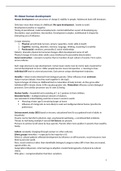H1 About human development
Human development: syst processes of change & stability in people. Adolescent brain stll immature.
Only later more than infancy & childhood: life-span development, ‘womb to tomb’.
Development positve or negatve.
Timing of parenthood, maternal employment, marital satsfacton as part of developing psy.
Descripton, expl, predicton, interventon. Development complex, multfaceted & shaped by
interactng arcs of infuence.
3 major domains:
1. Physical: growth body & brain, sensory capacites, motor skills & health
2. Cognitive: learning, atenton, memory, language, thinking, reasoning & creatvity
3. Psychosocial: emotons, personality & social relatonships
Puberty: dramatc physical & hormonal changes afect development sense of self.
Physical changes in brains older adults cause intellectual & personality deterioraton.
Social construction = concept or practce that is inventon of part culture of society. Form varies
across cultures.
Each stage physical & cogn development. Certain basic needs must be met & tasks mastered for
normal development to occur. Older people become more introspectve → meaning to lives.
Individual dif next to universal processes. Each person unique development trajectory.
Heredity = inborn traits inherited from biological parents. Other infuence from environm.
Nature-nurture debate. How they work together is the topic.
Typical changes of infancy & childhood ted to maturaton of body & brain. As they grow older
individual dif in innate charac & life exp play greater role. Maturation infuence certain biological
processes. Even similar processes vary in rates & tming.
Nuclear family = household unit consistng of 1 or 2 partners & their children.
Extended family = multgeneratonal network of relatves.
Less extended in industrializing world & increase in western world.
Marrying at later age & remaining longer at home
Infuence of immigrants & more likely to seek out multgeneratonal homes (practcal &
preference)
Socioeconomic status (SES) based on income, educatonal level & occupatonal level of adults in
household.
Poverty can be harmful to physical, cogn, psychosocial well-being → emotonal/beh problems.
Threats to well-being multply if several risk factors are present.
Pressure to achieve & lef alone by busy parents. Parents ofen more positve in poverty than wealthy
family.
Culture constantly changing (through contact w/ other cultures).
Ethnic groups/minorites → expected to be majority in US.
Ethnic & cultural paterns afected development by infuence on dif economic, social resources, how
think & perceive world.
Race: social construct rather than identiable biological category makes dif in how they are treated,
opportunites, etc.
Geographical dispersion, intermarriage & adapton created heterogeneity of physical & cultural
charac.
Ethic gloss = overgeneralizaton that blurs variatons
1






